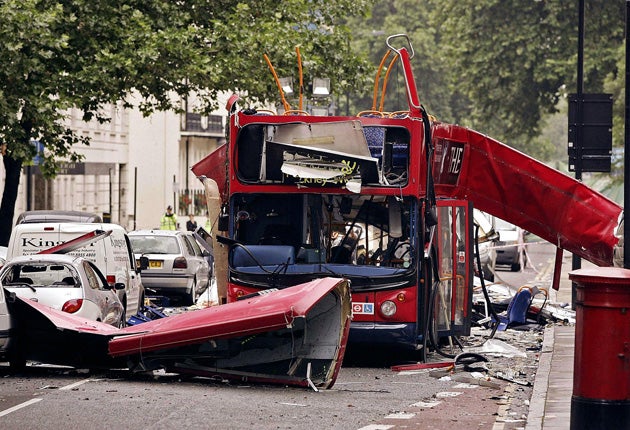London bombs were meant for a different day – and different locations
Ringleader called off strike on 6 July after wife's pregnancy scare / Inquest hears attackers wanted to hit Westminster and Bond St

Your support helps us to tell the story
From reproductive rights to climate change to Big Tech, The Independent is on the ground when the story is developing. Whether it's investigating the financials of Elon Musk's pro-Trump PAC or producing our latest documentary, 'The A Word', which shines a light on the American women fighting for reproductive rights, we know how important it is to parse out the facts from the messaging.
At such a critical moment in US history, we need reporters on the ground. Your donation allows us to keep sending journalists to speak to both sides of the story.
The Independent is trusted by Americans across the entire political spectrum. And unlike many other quality news outlets, we choose not to lock Americans out of our reporting and analysis with paywalls. We believe quality journalism should be available to everyone, paid for by those who can afford it.
Your support makes all the difference.The 7/7 bombings which killed 52 innocent London commuters may have originally been planned for a different day, an inquest heard yesterday.
Were it not for the fact that the wife of one of the bombers was taken to hospital with pregnancy complications, the plot would have gone ahead a day earlier, the court was told. It also emerged that the four bombs were originally intended to go off at Bond Street, South Kensington, Paddington and Westminster stations – but the bombers' train to London was delayed.
The details of the original plan were revealed at the opening of the long awaited inquest into the deaths of the victims yesterday. The hearing, at the Royal Courts of Justice, was resuming after a three-year adjournment due to criminal cases connected with the plot.
It began with Hugo Keith QC, for the inquest, reading aloud the name of each victim before the court rose to pay its respects with a one-minute silence.
During the first day of the hearing, the court heard new details about the events surrounding the worst terrorist attack ever perpetrated on British soil and about the bombers – Mohammad Sidique Khan, Shehzad Tanweer, Jermaine Lindsay and Hasib Hussain.
Chief among these was that the plot was originally planned for 6 July, a fact revealed in a text message recovered from the mobile phone of Khan, the ringleader. Khan had visited Dewsbury Hospital on 5 July 2005 with his wife, regarding complications surrounding their unborn child. The following day, he sent a text message to Hussein which read: "Having major problem. Can't make time." Khan's wife miscarried on 7 July. Mr Keith said: "It may have been that the attack was originally planned for a different day."
The first three bombs detonated at 8.49am at Edgware Road, Aldgate and Russell Square. The fourth went off on a bus at Tavistock Square an hour later. Mr Keith explained it was probable that the men intended to detonate their bombs simultaneously at different stations, but that their train from Luton, due to arrive at London King's Cross at 7.59am, did not arrive until 8.23am.
The detonation of the fourth bomb by Hasib Hussain was delayed because he forgot to bring the batteries for his detonator and had to buy some from a WH Smith store outside King's Cross, he added.
Mr Keith explained that the intended targets were revealed in a note inside Lindsay's passport, found in a Piccadilly line tunnel. CCTV footage of the men showed that they had carried out reconnaissance at South Kensington a week before the attacks.
Speaking about Tanweer, whose bomb exploded at Aldgate, Mr Keith said: "Had the train from Luton not arrived 24 minutes late, it is conceivable that Tanweer might have made it to Westminster via the eastbound Circle line by the detonation time of 08.50." Discussing Lindsay, whose explosive went off at Russell Square, the QC added: "From the reconnaissance trip on 28 June, it's possible to speculate that Lindsay was intending to get to South Kensington but was delayed on the Piccadilly line."
The court was also told of an incident on 7 July which may have suggested that one of the bombers had second thoughts. A London Underground employee said that a man resembling Lindsay approached him at King's Cross and said he wanted to speak to the duty manager about something "very important", but disappeared before the manager arrived. Mr Keith played down the significance of this, explaining that the employee said he thought this had happened at 8.15am. The bombers did not arrive until 8.23am.
There was also evidence that the bombers had prepared for the possibility they might be apprehended before they could detonate their bombs. The Nissan Micra used to take three of them from Leeds to Luton contained eight devices, half of which were made from shallow dishes and half from tubes. Mr Keith said: "It may be that the intention of the bombers had been to throw them if apprehended."
It was also revealed that a possible opportunity to apprehend Lindsay was missed. Weeks before the attacks, he was thought to be involved in an armed robbery but was never caught. On the morning of the attack, Lindsay received a parking ticket as he slept in his car. The attendant did not wake Lindsay because he feared being assaulted.
Join our commenting forum
Join thought-provoking conversations, follow other Independent readers and see their replies
Comments